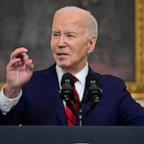Excerpt: "Soldier: the Life of Colin Powell"
Oct. 11, 2006 — -- In the first complete biography of Colin Powell, Washington Post reporter Karen Young details the entire career of the former secretary of state.
"Soldier" starts with Powell's growing up as the son of a Jamaican immigrant in the Bronx and follows his meteoric rise through the ranks of the military. Young reveals how he ascended to some of the most coveted, powerful positions in Washington.
Drawing on her six in-depth interviews with Powell along with previously unreleased personal and professional papers, Young paints a vivid picture of one of the most influential men in the country.
When Adolfo Aguilar Zinser walked into the Security Council on Wednesday morning, the first things he noticed were the video screens and computers that had been installed for Powell's multimedia presentation. It was a sure sign, Mexico's U.N. ambassador thought with some disdain, that "this show wasn't for us. It was for an international audience, for the U.S. media."
Outside, New York City police officers directed limousine convoys through the high iron gates and onto the circular U.N. driveway, where they deposited arriving foreign ministers and dignitaries. Television satellite trucks were lined up wheel to wheel along First Avenue, and reporters stood shivering in the icy February wind as they shouted into handheld microphones.
The speech was being broadcast live around the world, but a long line of spectators, hoping to watch history being made firsthand, snaked through a white security tent. Every seat in the visitors' gallery was filled when Powell entered the chamber just before 10:30 a.m., smiling and stopping to shake hands as he made his way across the floor. By the time he took his chair at the horseshoe-shaped Council table at the center of the room, with Tenet seated behind his right shoulder and Negroponte behind his left, his features were composed in a mask of gravity.
With war hanging in the balance and the power and prestige of the United States on full display, it was a moment of high drama that owed as much to the player as to the play. A nationwide poll released just that morning had found that "when it comes to U.S. policy toward Iraq," Americans trusted Powell more than Bush by a margin of 63 to 24 percent. His reputation as the "reluctant warrior" and as the administration's leading dove -- arguably its only one -- would lend incalculable credibility to the case he was about to make.
"I cannot tell you everything that we know," he began after a brief introduction. "But what I can share with you, when combined with what all of us have learned over the years, is deeply troubling." The facts and Iraq's behavior "demonstrate that Saddam Hussein and his regime have made no effort -- no effort -- to disarm as required by the international community." He moved quickly into his first demonstration, an audiotape of two Iraqi officers he said were discussing the concealment of a "modified vehicle" on November 26, 2002, the day before inspections began. As the scratchy Arabic words echoed through the chamber, an English translation appeared on the video screen."My colleagues," Powell said, "every statement I make today is backed up by sources, solid sources. These are not assertions. What we are giving you are facts and conclusions based on solid intelligence."




